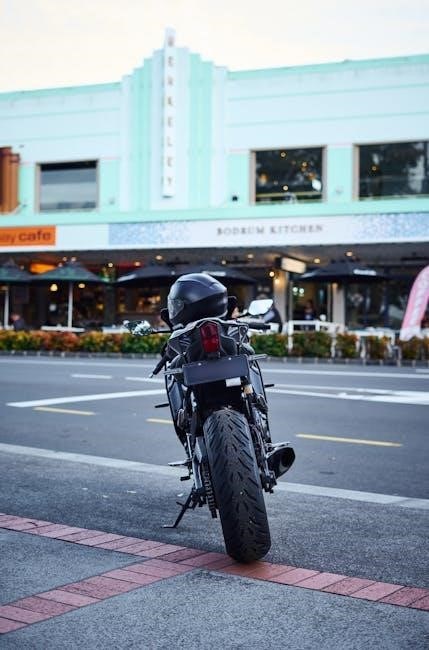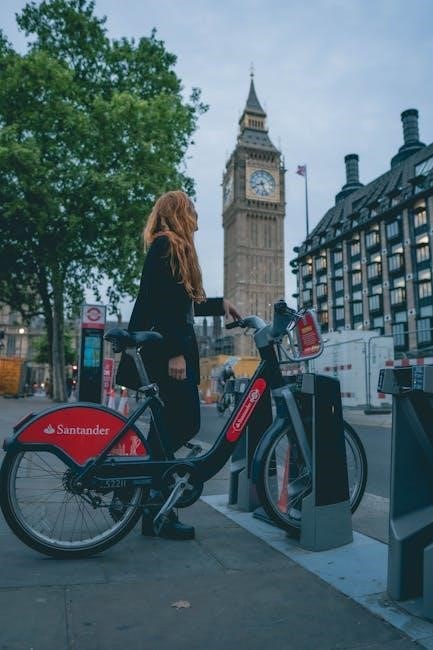
New Zealand offers stunning landscapes and diverse trails, making it a paradise for self-guided bike tours. These tours provide flexibility, allowing cyclists to explore iconic landmarks, immerse in local culture, and enjoy the freedom of pacing their adventure. With routes catering to all skill levels, self-guided tours combine physical challenge with breathtaking scenery, creating unforgettable experiences for cyclists of all backgrounds and interests.
Overview of Self-Guided Tours
Self-guided bike tours in New Zealand offer unparalleled freedom and flexibility, allowing cyclists to explore stunning landscapes at their own pace. These tours provide detailed itineraries, maps, and support services, enabling riders to craft personalized adventures. With routes suited to all fitness levels, self-guided tours combine independence with convenience, making them ideal for those seeking an immersive and stress-free cycling experience across New Zealand’s diverse terrain.
Advantages of Self-Guided Tours
Self-guided tours offer the freedom to explore New Zealand at your own pace, allowing for spontaneous detours and deeper immersion into local culture. They are cost-effective, as they eliminate the expense of guided groups, and provide a personalized experience tailored to individual preferences; This flexibility makes self-guided tours ideal for cyclists seeking an independent, adventurous, and memorable journey through New Zealand’s breathtaking landscapes.

Popular Routes and Trails
New Zealand’s popular routes include the Alps to Ocean Cycle Trail and Queenstown Trail, offering diverse landscapes and varied terrain for cyclists of all levels.
Alps to Ocean Cycle Trail
The Alps to Ocean Cycle Trail spans 316 km, tracing a breathtaking journey from the Southern Alps to the Pacific Ocean. This diverse route offers stunning scenery, from rugged mountains and pristine lakes to rolling countryside and coastal views. Suitable for all skill levels, it features a mix of challenging climbs and leisurely flats, making it a must-do for self-guided cyclists seeking adventure and natural beauty.
Queenstown Trail
The Queenstown Trail is a 110 km network of scenic bike paths and trails around Queenstown, offering diverse routes for all skill levels. Riders can explore stunning landscapes, including the shores of Lake Wakatipu, Gibbston Valley vineyards, and the historic Arrow River. With family-friendly sections and challenging climbs, the trail provides a mix of adventure and relaxation, making it a must-do for self-guided cyclists in New Zealand.
Other Notable Trails
Beyond the Alps to Ocean and Queenstown Trail, New Zealand boasts other exceptional self-guided bike routes. The Timber Trail offers 84 km of scenic riding through ancient forests and historic logging sites. The Waikato River Trails provide a gentle 100 km journey along New Zealand’s longest river, with cultural and natural highlights. The Great Taste Trail combines coastal views with artisanal food and art, showcasing the Nelson region’s charm.
Planning and Preparation
Planning is crucial for a seamless self-guided bike tour in New Zealand. Research routes, check weather conditions, and ensure your bike is well-maintained. Proper preparation guarantees a smooth adventure.
Choosing the Right Bike
Selecting the right bike for your self-guided New Zealand tour is essential. Opt for a sturdy, reliable model suited to the terrain, whether road, mountain, or hybrid. Ensure proper gearing for climbs and descents, and consider suspension for comfort on rough trails. Check tire width and durability for varying conditions. A well-fitted bike enhances performance and reduces fatigue, ensuring an enjoyable journey through New Zealand’s diverse landscapes.
Creating an Itinerary
Plan your self-guided bike tour by mapping routes, scheduling daily distances, and booking accommodations in advance. Consider trail difficulty, scenic stops, and rest days. Balance riding time with cultural experiences and local attractions. Use maps, GPS apps, and weather forecasts to refine your plan. Allow flexibility for spontaneous detours and ensure a mix of challenge and relaxation for an enjoyable journey.
Physical Conditioning Tips
Prepare for your self-guided bike tour by building cardiovascular endurance and muscle strength. Start training weeks in advance with regular rides, incorporating hills and long distances. Include strength exercises for legs and core, and stretch to improve flexibility. Gradually increase ride intensity to avoid fatigue. Ensure rest days are included to prevent overtraining. Stay hydrated, pace yourself, and maintain a steady rhythm during your tour for optimal performance.
Accommodation Options
New Zealand offers a wide range of accommodation options for self-guided bike tours, from cozy lodges to budget-friendly camping sites, ensuring a comfortable stay for every cyclist.
Bike-Friendly Hotels and Lodges
New Zealand boasts numerous bike-friendly hotels and lodges tailored for cyclists. These accommodations offer secure bike storage, maintenance stations, and convenient access to trails. Many provide complimentary services like bike wash stations and repair kits, ensuring a seamless cycling experience. Lodges often feature scenic views, hearty meals, and relaxing amenities, making them ideal for unwinding after a day on the trails; Popular options include boutique hotels near the Alps to Ocean trail and eco-lodges nestled in picturesque countryside settings.
Camping and Budget Stays
Camping and budget stays offer affordable and immersive ways to experience New Zealand’s self-guided bike tours. Department of Conservation campsites provide basic facilities at low costs, often near scenic trails. Budget hostels and guesthouses offer shared or private rooms with communal spaces to connect with fellow travelers. These options allow cyclists to save money while enjoying the country’s stunning landscapes and vibrant culture, with easy access to cycling routes.
Safety Considerations
Ensure road safety by sharing paths with traffic, carrying repair kits, and checking weather forecasts. Stay visible with reflective gear and lights, and always carry a communication device.
Road Safety Tips
Always wear a helmet and ensure your bike is well-maintained. Ride on the left side of the road, following traffic rules; Use lights and reflective gear for visibility. Stay alert to surroundings, avoiding distractions. Carry a basic repair kit and know how to use it. Plan routes with lower traffic and share paths courteously with others. Stay hydrated and take regular breaks to avoid fatigue.
Weather and Terrain Precautions
Check weather forecasts regularly and prepare for unpredictable conditions. Assess trail difficulty to match your skill level. Wear layered, breathable clothing for varying temperatures and carry a waterproof jacket. Sturdy footwear is essential for uneven terrain. Carry a map, compass, or GPS for navigation in remote areas. Stay hydrated, pack snacks, and apply sunscreen to protect against harsh UV rays.
Emergency Preparedness
Always carry a first aid kit, spare tires, and basic tools for bike repairs. Ensure your phone is fully charged and consider a portable charger. Carry an emergency blanket and snacks for unexpected delays. Familiarize yourself with local emergency contact numbers and inform someone of your route. Be prepared for sudden weather changes and know the nearest medical facility along your trail.
Cultural Experiences
New Zealand self-guided bike tours offer a chance to immerse yourself in rich cultural experiences, engage with friendly locals, and explore historic sites. The slower pace allows cyclists to connect with the country’s unique heritage and enjoy authentic local food and traditions, creating a memorable journey.
Engaging with Local Communities
Self-guided bike tours in New Zealand offer a unique opportunity to engage with local communities. Cyclists can stop at charming cafes, interact with friendly locals, and explore small towns. Many communities welcome cyclists with open arms, offering insights into regional history and culture. This direct connection enhances the travel experience, allowing riders to forge meaningful connections and gain authentic insights into New Zealand’s diverse heritage.
Exploring Iconic Landmarks
New Zealand’s self-guided bike tours offer cyclists the chance to explore iconic landmarks like Aoraki Mount Cook and Lake Tekapo. Riders can peddle along scenic routes, taking in breathtaking views of the Southern Alps and pristine lakes. The freedom to stop and absorb these natural wonders creates unforgettable moments, allowing cyclists to deeply connect with the country’s stunning landscapes and cultural heritage.
Logistics and Support
Self-guided bike tours in New Zealand are supported by excellent logistics, including bike rentals, luggage transfers, and transportation services, ensuring a seamless and enjoyable cycling experience.
Transportation Options
New Zealand offers convenient transportation options for self-guided bike tours, including bike-friendly public transport, private shuttle services, and luggage transfer companies. Many trails are accessible by bus or train, with cycle carriers available. Private shuttles provide flexibility for remote trail access, while luggage transfers allow cyclists to ride unencumbered. Local guides and support vehicles are also available for added convenience and safety during your journey.
Bike Rental Services
Renting a bike in New Zealand is seamless, with numerous rental services offering high-quality bikes tailored for self-guided tours. Choose from mountain bikes, road bikes, or e-bikes, all equipped with essential accessories. Many companies provide door-to-door delivery, while others include GPS devices loaded with trail maps. Rental packages often cover maintenance and repair support, ensuring a hassle-free cycling adventure across New Zealand’s diverse landscapes and trails.
Luggage Transfer Services
Luggage transfer services simplify self-guided bike tours by transporting bags between accommodations. Cyclists can ride unencumbered, enjoying the freedom of lightweight travel. Many tour companies offer this convenience, ensuring seamless logistics. With luggage securely transferred, riders focus solely on the scenic trails and cultural experiences, enhancing the overall adventure and providing peace of mind throughout their journey across New Zealand’s stunning landscapes.

Seasonal Considerations
New Zealand’s seasons vary, with summer offering ideal cycling conditions. Plan tours during spring or autumn for mild weather, avoiding winter’s colder months. Popular trails are busiest from December to February, while shoulder seasons provide quieter paths and scenic beauty, enhancing the cycling experience across diverse landscapes.
Best Times to Visit
New Zealand’s best cycling season is summer (December to February), offering warm weather and long days. Spring (September to November) and autumn (March to May) provide mild temperatures and vibrant landscapes, ideal for bike tours. Winter (June to August) is cooler, but some trails remain accessible for experienced cyclists. Plan your tour during these periods for optimal conditions and scenic beauty.
Seasonal Challenges and Benefits
New Zealand’s distinct seasons present cyclists with unique challenges and benefits. Summer offers warm weather and extended daylight, ideal for cycling, but may be crowded. Autumn provides mild temperatures and vibrant foliage, reducing crowds. Winter brings cooler conditions with fewer tourists but some trail closures. Spring showcases blooming landscapes and moderate weather, perfect for exploring without peak-season crowds. Each season offers a distinct cycling experience.

Budgeting and Costs
Budgeting for self-guided bike tours in New Zealand requires planning, as costs vary based on bike rentals, accommodations, and dining choices. Plan accordingly to suit your budget.
Estimating Expenses
Estimating expenses for a self-guided bike tour in New Zealand is crucial for budgeting. Costs include bike rentals (NZD $40-$70/day), accommodation (NZD $30-$100/night), meals ($15-$30/meal), and transportation. Additional expenses like gear, snacks, and activities should be considered. Plan for a daily budget of $150-$300 per person, depending on your choices of lodging, dining, and extras. This ensures a well-prepared financial plan for your adventure.
Money-Saving Tips
To save money on a self-guided bike tour in New Zealand, consider camping or staying in budget accommodations. Preparing meals instead of dining out can reduce costs. Plan your itinerary efficiently to minimize transportation expenses. Look for bike rental packages that include gear. Booking in advance and traveling during off-peak seasons can also lead to significant discounts. These strategies help maximize your adventure while minimizing spending.
Packing Essentials
Essentials include a sturdy bike, cycling gear, comfortable clothing, safety equipment like helmets, basic tools, a first-aid kit, and a GPS for navigation.
Must-Have Gear
A sturdy, well-maintained bike, preferably a mountain or hybrid model, is essential. Pack a helmet, basic toolkit, spare tire, and puncture repair kit. Bring comfortable, breathable clothing, waterproof gear, and layered options for varying weather. Include a water bottle or hydration pack, snacks, and a first-aid kit. A GPS device or map is crucial for navigation. Don’t forget sunscreen, insect repellent, and a portable phone charger for emergencies.
Packing Tips for Cyclists
Pack lightweight, versatile clothing suitable for varying weather conditions. Use waterproof bags to protect gear from rain. Organize essentials like tools, snacks, and first-aid kits in easy-to-access compartments. Roll clothing to save space and reduce wrinkles; Bring a reusable water bottle and portable phone charger. Consider a small daypack for off-bike excursions. Plan outfits that can be layered for changing temperatures, ensuring comfort throughout your ride.
Documentation and Requirements
Ensure a valid passport, visa, and travel insurance covering cycling activities. Carry identification, emergency contacts, and medical insurance details. Pack bike rental agreements and accommodation bookings for smooth logistics.
Visa and Passport Information
A valid passport is essential for entry into New Zealand. Depending on your nationality, you may need a visa or an NZeTA (New Zealand Electronic Travel Authority). Ensure your passport is valid for at least six months beyond your stay. Citizens of visa-waiver countries can stay up to 90 days. Check specific requirements and apply in advance to avoid delays. Travel insurance covering cycling activities is also recommended.
Travel Insurance
Travel insurance is crucial for self-guided bike tours in New Zealand, covering unexpected medical emergencies, trip cancellations, and delays. Ensure your policy includes coverage for cycling activities, as standard policies may exclude adventure sports. Look for insurance that covers bike damage, loss, or theft, and emergency evacuations, especially in remote areas. Always review the policy terms to ensure it meets your specific needs.

Environmental and Cultural Etiquette
Respect New Zealand’s pristine environment by minimizing waste and staying on trails. Honor cultural traditions by engaging respectfully with local communities and preserving heritage sites.
Respecting the Environment
When embarking on self-guided bike tours in New Zealand, it’s essential to respect the environment. Carry a reusable water bottle and bag to minimize waste. Stay on designated trails to avoid erosion and protect flora and fauna. Avoid littering and recycle when possible. By preserving natural habitats and adhering to local guidelines, cyclists can help maintain New Zealand’s pristine landscapes for future generations.
Cultural Sensitivity
Engaging with New Zealand’s rich Māori culture and local communities requires respect and awareness. Learn basic Māori greetings, understand local customs, and support indigenous businesses. When visiting sacred sites, follow guidelines and remove shoes if requested. Be mindful of cultural protocols, such as not touching carvings or entering restricted areas. Respectful interactions foster meaningful connections and preserve cultural heritage, enhancing your biking adventure.
New Zealand’s diverse landscapes and well-designed trails make it a cyclist’s paradise, offering empowering self-guided adventures that deeply connect riders with nature and rich culture.
Final Tips and Encouragement
Embark on your New Zealand self-guided bike tour with confidence! Plan thoroughly, stay flexible, and prioritize safety. Embrace the freedom to connect with nature and culture at your own pace. Capture memories, challenge yourself, and soak in the breathtaking scenery. Whether a novice or experienced cyclist, this adventure promises unforgettable experiences and personal growth. Enjoy the ride!